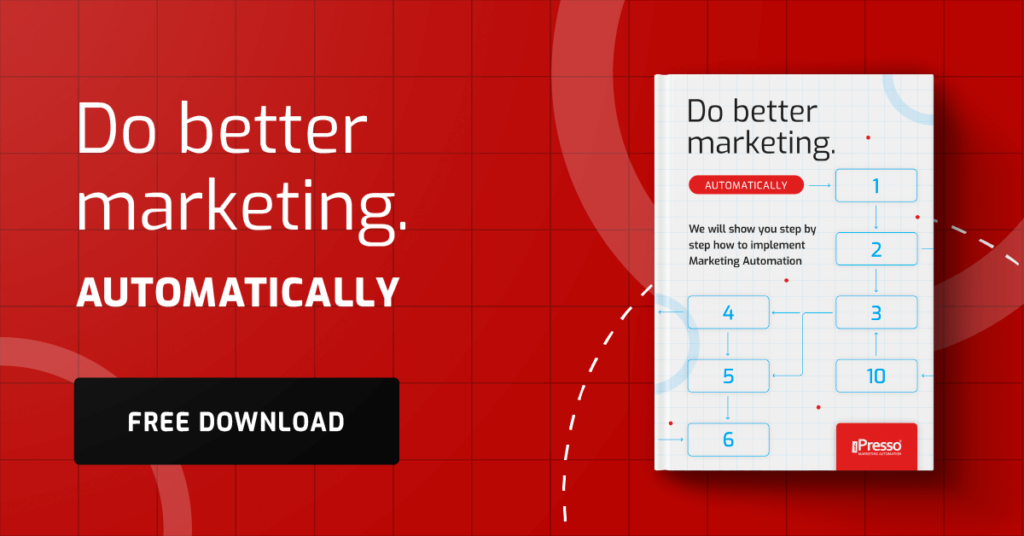How does marketing automation improve demand generation?

Demand generation is a strategy focused on increasing customer awareness of the company and its offerings. Marketing Automation plays a key role in implementing this strategy, enabling the automation of marketing processes, which allows you to reach the target audience more effectively and build relationships with customers.
Demand generation uses both Outbound Marketing and Inbound Marketing strategies. Thanks to Marketing Automation, these campaigns are consistent and individual activities are properly integrated. This allows you to formulate a clear message, necessary to build a positive image of the company.
Due to the rapid development of new technologies and the emergence of various forms of communication, modern consumers are increasingly seeking information on their own about the products and services that interest them. For most of them, traditional advertising banners and advertisements are not the main source of information. Instead, customers determine their own needs and make purchasing decisions based on information available on the Internet.
The intense activity of consumers in searching for information and making purchasing decisions forces companies to re-evaluate their marketing strategies. Traditional outbound marketing activities, which involve actively bombarding customers with advertisements, are becoming less and less effective because they are often ignored by modern consumers. Therefore, it becomes necessary to introduce more effective methods, such as Inbound Marketing, which allows potential customers to find the information they are interested in on their own. This way, the company can engage its target group more effectively and build lasting relationships with customers.
Demand generation activities, both those using Outbound Marketing strategies and those based on Inbound Marketing, should be integrated with each other, creating a coherent brand image. By integrating these activities, the company can reach its target group more effectively, build trust and interest, and guide customers through the entire purchasing process, from brand awareness to the purchase decision. This way, the company can achieve better results and build lasting relationships with customers.
The use of the Marketing Automation system is crucial for the effective integration of various forms of marketing and customer communication channels as part of demand generation activities. This system enables the automation of marketing processes, which allows for consistent and synchronized transfer of information about the brand and products or services, increasing brand awareness and building a positive image of the company in the minds of recipients. Thanks to this, the company can engage its target group more effectively and guide them throughout the entire purchasing cycle.
How to build awareness with the Marketing Automation system?
Original and valuable content is crucial because it allows the company to stand out from the competition and build customer trust and loyalty. Thanks to unique content, a company can attract the attention of its audience, engage them and build lasting relationships. In addition, original content has a positive impact on search engine positioning, improving the website’s visibility and increasing the chances of reaching new customers. Additionally, providing valuable content allows the company to consolidate its expertise in a given field, which translates into increased customer trust and a greater willingness to choose its products or services. As a result, original and valuable content is essential for building a positive brand image and achieving success in today’s competitive business environment.
By publishing original and attractive content, the company allows users to find it more easily on the Internet, which leads to generating valuable traffic on websites and, consequently, increases the number of customers. The Marketing Automation system effectively manages this traffic, monitors it and analyzes the results obtained. Thanks to this, the company can track user behavior, adapt the marketing strategy to their needs and preferences, and take appropriate actions to further increase the effectiveness of its marketing activities.
Marketing Automation enables the publication of content in various channels and its distribution to specific consumer groups. Content may be published on websites, blogs and social media platforms. The system also enables sending e-mails, newsletters and distributing press releases to the media. Additionally, it manages loyalty programs, which allows the company to effectively engage customers and build relationships with them. Thanks to this tool, the company can effectively manage its marketing communications, reach the right group of recipients and achieve better results.
Thanks to marketing automation, the management of loyalty programs becomes more effective and automated. Marketing Automation systems allow companies to track customer activity, such as purchases, website interactions, and responses to marketing campaigns. Based on this data, the system can automatically award loyalty points, prizes and personalized offers to customers. Additionally, Marketing Automation facilitates communication with loyalty program participants by sending personalized e-mails, push notifications or SMS messages, which allows you to build a bond with customers and increase their involvement in the loyalty program. This allows companies to more effectively build customer loyalty and increase their lifetime value to the company.
With this approach, consumers interested in a given industry will often encounter content that leads them to the company and its products. This, in turn, leads to an increase in awareness of the company’s existence and building its reputation as an expert in its field. The use of surveys and landing pages allows you to obtain data from those consumers who are most interested in using the company’s services. This allows the company to better understand the needs and preferences of customers and adapt its marketing activities, which translates into greater effectiveness and efficiency of its campaigns.
NPS (Net Promoter Score) surveys can be effectively integrated with Marketing Automation systems to automate the process of collecting customer opinions and taking actions based on them. Marketing Automation systems allow you to automatically send an NPS survey to customers at specific moments of interaction, for example after a purchase, after handling an inquiry or after completing a service subscription. After receiving the response, the system can automatically classify customers based on their ratings (promoters, neutrals, detractors) and take appropriate actions.
For example, if a customer gave a positive rating (promoter), the system can automatically offer him participation in a referral program or send him a personalized promotional offer. However, in the case of a negative rating (critic), the system can automatically redirect the appropriate request to the customer service department in order to solve the problem and minimize the risk of losing the customer.
Integrating the NPS survey with Marketing Automation allows companies to constantly monitor customer satisfaction, quickly respond to their opinions and take actions to increase customer loyalty and retention. Thanks to this, the company can more effectively build a positive brand image and increase the value of its customer base.
Monitoring customer activity
Marketing Automation collects customer data in various ways, depending on the platform used and system configuration. Here are some basic ways that can be used:
1. Marketing Automation collects basic contact information about customers, such as e-mail address, telephone number or physical address, which are entered by customers when registering on the website, in contact forms or during the purchasing process.
2. The system tracks customer interactions with various marketing channels, such as website, emails, social media and online advertising. It collects information about customer activity, such as websites visited, e-mails opened, links clicked and completed transactions.
3. In addition to contact data and interaction information, Marketing Automation may also collect demographic data (such as age, gender, geographic location) and customer behavior (e.g. shopping preferences, purchase frequency, average transaction value).
4. Marketing Automation systems can be integrated with other tools and systems, such as CRM (Customer Relationship Management), e-commerce systems or data analysis tools. This allows them to retrieve additional customer information that is stored in these systems.
5. Marketing Automation may also collect data from customers through surveys or form submissions, which can be used to explore customer preferences and opinions.
All this data is stored in the Marketing Automation database and can be used to personalize communications, analyze customer behavior and take more targeted marketing activities.
The Marketing Automation system can automatically guide the customer through the entire sales process, communicating with him through optimally selected communication channels and adapting messages to the customer’s current stage.
Marketing Automation monitors user activity in response to received offers and generates reports on the conversion of sent shipments. Additionally, it conducts lead scoring assessments, awarding consumers points for specific activities. Thanks to this, the system is able to identify which users are most interested in the offer and which ones are worth continuing communication with to further build brand awareness and promote the benefits of using its services.
To sum up
A marketing automation system plays a key role in improving demand generation through automated and personalized marketing activities. Thanks to this tool, companies can reach their target group more effectively, engage customers and build lasting relationships. By monitoring customer activity, segmenting the database, conducting lead scoring and personalizing communication, the marketing automation system enables the delivery of appropriate content at the right time and on appropriate communication channels. As a result, companies can more effectively build brand awareness, increase customer engagement and generate greater interest in the products and services offered, which leads to increased sales and better business results.
Take advantage of the 30-day free trial and see how iPresso can revolutionize your marketing activities! With our marketing automation system, you will be able to easily create, personalize and automate marketing campaigns, generating more demand for your products or services. Track customer activity, conduct lead scoring and provide personalized content to effectively engage your target group. Don’t wait any longer – try iPresso today and see how we can help you achieve better marketing results!



